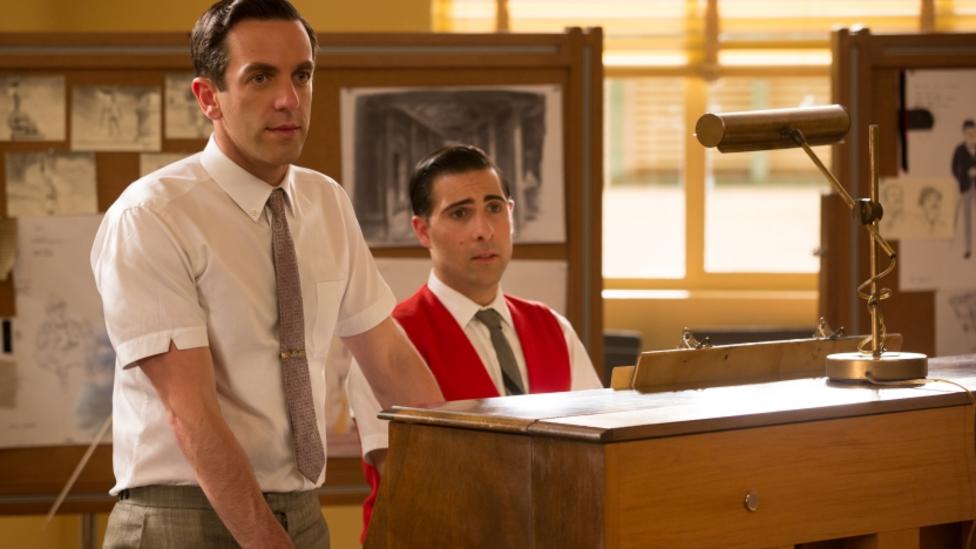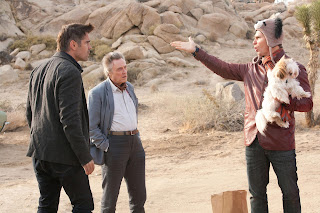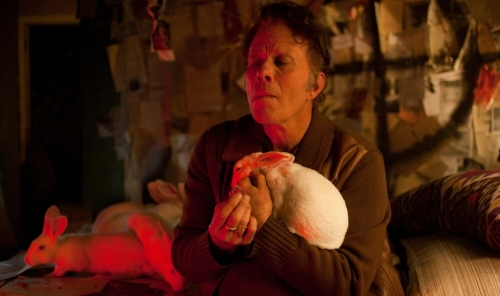 |
| Image via The Guardian |
Hollywood loves nothing more than itself. So I guess it’s fitting that a movie about Walt Disney was made by Walt Disney Pictures. Walt Disney made a movie about Walt Disney whether you like it or not.


 |
| Image via The Guardian |
Hollywood loves nothing more than itself. So I guess it’s fitting that a movie about Walt Disney was made by Walt Disney Pictures. Walt Disney made a movie about Walt Disney whether you like it or not.

 |
| This is one of my favorite movie stills of all time. |
“Seven Psychopaths” is one of those film in which its title is also the title of the screenplay a character is writing in the film. However, it’s not one of those films that just ends with the final scene being typed out, so we can take comfort in knowing that everything that just happened was only in some writer’s head.
“Seven Psychopaths” is an insane deconstruction of action movies that I loved every minute of. Perhaps Hollywood has reached a tipping point when it comes to telling crime tales, and “Seven Psychopaths” is exactly what it needed to put it back in line. Meta films walk a very tight rope, and “Seven Psychopaths” manages to consistently stay in line.
I have never understood why films about screenwriters have gotten such a bad reputation. Thanks to the weird minds of screenwriters created by the weird minds of screenwriters, we’ve gotten “Sunset Boulevard,” “Barton Fink,” and “Being John Malkovich.” I have a feeling that “Seven Psychopaths” was written when Martin McDonagh was going through writer’s block. Marty Faranan (Colin Farrell) hasn’t gotten past the title for his latest script, “Seven Psychopaths.” Marty is a drunk, which is in his heritage, as others tend to frequently remind him. He is also in a bad relationship with a controlling girlfriend (Abbie Cornish). He wants his script to be about seven different psychopaths. However, he’s having trouble finding his psychos.
“Seven Psychopaths” was made for both film buffs and crime news fanatics. Marty’s best friend happens to be a dognapper named Billy (Sam Rockwell). He wants to help Marty write his script, so he puts out an ad seeking out every psychopath in Los Angeles with a great story. Billy is always eating junk food and he may be completely insane. I always knew Rockwell was a great actor, but I never realized he could be this funny. His performance is filled with twitchiness and manic energy that makes it impossible to know what he could do next. If for some reason another film about Hunter S. Thompson were to be made (I’m hoping for a version of “Rum Diary” that’s actually good), I would cast Rockwell above all others to play Thompson.
Christopher Walken, in his best role in years, plays Hans, the eccentric boss of the dognapping empire. While he can kill it in small roles (“Pulp Fiction,” “Annie Hall”) he is capable of emotional range that goes much further than “creepy guy with a raspy voice.” His character is that archetypal old criminal who seems too nice to ever shoot. He’s also raising money for the same reason many other film criminals have: his wife has cancer. Why he thinks dognapping is the best way to pay for his wife’s treatment is beyond me, but I don’t think the reasons are all that important.

“Seven Psychopaths” commits so many felonies against good screenwriting. Yet, it breaks all of the rules with such confidence and self-awareness that it just can’t be held against McDonagh. Now, I’m not saying that self-awareness is an excuse for bad writing. However, they come across much better when they are done intentionally. “Seven Psychopaths” knows that the kind of story it wants to tell has been done so many times before, so it might as well try to present it in a new way.
“Seven Psychopaths” introduces characters and subplots, and then gets rid of them whenever it damn well pleases. Breaking screenwriting rules is actually beneficial here: it adds a dangerous, unstable element to the whole story. It’s a screenwriter projecting his own mind through the eyes of another screenwriter, and neither have any idea where their own stories can take them. And that is a beautiful thing about writing a film: when you have absolutely no idea where the story you are inventing is going to end.
Despite the unpredictability, McDonagh seemed to have a good plan for where to end this film in the same way that “In Bruges” tied everything together so perfectly in the end. “Seven Psychopaths” is a huge ensemble, and it makes a mobster played by Woody Harrelson, a serial killer who kills mobsters, and an adorable Shih Tzu all come together. I am not trying to start a fight here, but I will take that Shih Tzu over Uggie any day of the week.

I see “Seven Psychopaths” as being about the purpose of violence in movies. Sometimes, it has to exist just punish people who had it coming. At one point, Billy suggests they all just go out into the desert and forget about everything that happened. That doesn’t work for long, and not only because Billy is an idiot. Perhaps the reason that heist films end in a shootout is because that’s the only natural course for a criminal to go on. No matter how hard you try, cliches can never be completely avoided. But if you present them in the right way, they can show why movies are such an exhilarating experience.
A friend of mine made a very accurate remark about Martin McDonagh, in that he is the only auteur bred during a generation of Tarantino ripoffs that can ripoff Tarantino correctly. That may be partly because McDonagh got his training in theater, so he knows how to write the long scenes of dialogue that mark a Tarantino film. Not only that, but he also gives the characters funny and insightful things to say. We don’t mind if the story is delayed for a bit, because what the characters are saying is so good to listen to. If a film has good dialogue, that means it can be listened to without the accompanying images and still be just as good.
As someone who is currently writing a script, “Seven Psychopaths” spoke to me on a very high level by nailing a writer’s journey. Whenever it looks like we’re just sitting there doing nothing, there is actually about a thousand ideas forming in our heads, looking for ways to become a whole. “Seven Psychopaths” is filled with little mini stories that are just as good as the main story. Some of the mini stories are made up and told within a story that is also made up. “Seven Psychopaths” is a movie about how life doesn’t turn out like it does in the movie. Try not to let your head explode before you can actually go see it for yourself.
 |
| Yes, that is Tom Waits and a bunny rabbit. |
I only post trailers for movies when it is something I am irrationally excited for and have irrationally high expectations for.
Today, the trailer for “Seven Psychopaths,” the new film from Martin McDonagh, was released. McDonagh’s last film was his 2008 directorial debut “In Bruges” which remains one of my favorite films of the past five years. “Seven Psychopaths” has McDonagh re-teaming with Colin Farrell, whose abilities as a comedic actor remain severely underrated. It also stars Sam Rockwell and Christopher Walken, who are two of my favorite actors, as well as Woody Harrelson, who I like most of the time. It also has Gabourey Sidibe (Precious) sitting on a toilet, just in case you were dying to know what that looks like.
The story seems to revolve around criminals who kidnap people’s dogs, return them, and then collect the reward money. “Seven Psychopaths” could be somewhat less dark than “In Bruges,” if there are as many animal reaction shots in it as the trailer seems to portend. However, based on “Bruges,” McDonagh is not one who will let criminals get away with their wrongdoings unscathed.
Are you as excited for “Seven Psychopaths” as I am? Have you seen “In Bruges” yet? If your answer to the latter question is no, go rent it right away. Watch the trailer for “Seven Psychopaths” below:
 Twelve years ago, Mike Judge mastered the cubicle comedy with “Office Space.” His workers just wanted freedom. In this summer’s “Horrible Bosses,” all the workers want to do is have their bosses killed. It’s funny how things change like that.
Twelve years ago, Mike Judge mastered the cubicle comedy with “Office Space.” His workers just wanted freedom. In this summer’s “Horrible Bosses,” all the workers want to do is have their bosses killed. It’s funny how things change like that.



